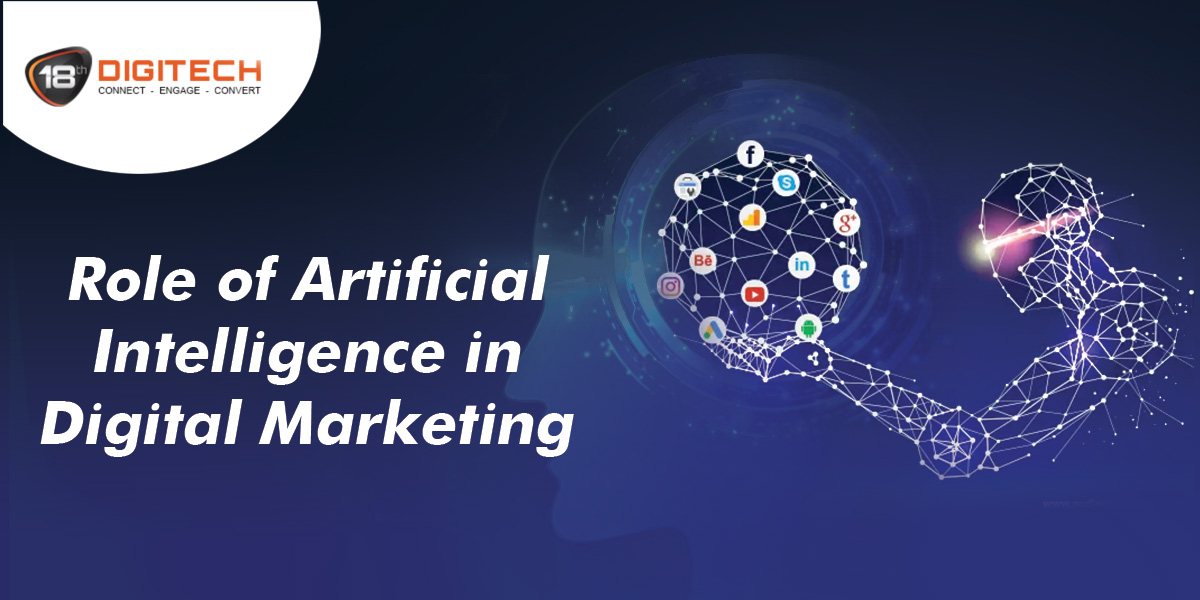In the world of digital marketing, staying ahead of the competition is a perpetual challenge. To thrive in this environment, businesses must embrace technological advancements that enhance their strategies. Artificial Intelligence (AI) has emerged as a game-changer, empowering digital marketers with the tools to target their audiences more effectively, personalise content, and optimise campaigns.
This blog explores the multifaceted role of AI in digital marketing and how it is revolutionising the industry.
What is AI in Digital Marketing?
AI in Digital Marketing refers to the integration of Artificial Intelligence technologies into various aspects of the digital marketing landscape. It encompasses a wide range of AI-driven tools and techniques that empower marketers to streamline their strategies, make data-driven decisions, and enhance user experiences. AI in digital marketing involves the use of algorithms and machine learning to analyse vast amounts of data, allowing for more precise targeting, personalised content, and improved campaign optimisation. This technology not only automates routine tasks but also augments marketing efforts with predictive analytics, chatbots for customer support, content generation, and much more. AI in digital marketing has become an essential component, helping businesses stay competitive, engage with their audiences effectively, and ultimately achieve their marketing objectives in an increasingly dynamic and data-driven online environment.
Applications of AI in Digital Marketing
AI (Artificial Intelligence) plays a pivotal role in revolutionising digital marketing by offering a plethora of applications that empower businesses to enhance their marketing strategies. Here are some key applications of AI in digital marketing:
- Data Analysis and Insights: AI can swiftly process vast amounts of data, enabling marketers to gain valuable insights into consumer behaviour, preferences, and trends. This data-driven approach helps in making informed decisions and crafting more effective marketing campaigns.
- Personalisation: AI enables the creation of highly personalised content, recommendations, and experiences for users. By analysing user data, AI can tailor marketing messages to individual preferences, thereby increasing user engagement and conversion rates.
- Chatbots and Customer Support: AI-powered chatbots provide 24/7 customer support, responding to queries and resolving issues promptly. This not only improves user experience but also reduces the workload on customer support teams.
- Predictive Analytics: AI algorithms can forecast market trends and consumer behaviour based on historical data. Marketers can use this predictive capability to plan and execute campaigns that are more likely to resonate with their target audience.
- Content Creation and Optimisation: AI-driven tools, such as natural language processing (NLP), assist in content creation and optimisation. Marketers can generate high-quality, relevant content more efficiently and ensure it is SEO-friendly.
- Email Marketing and Campaign Optimisation: AI can optimise email marketing by segmenting lists, personalising content, and determining the best send times. It also enables A/B testing and analyses user responses to improve future campaigns.
- Advertising and Ad Campaign Management: AI-powered programmatic advertising platforms automate ad placement and targeting, making it more precise and cost-effective. AI also assists in A/B testing and the creation of dynamic, audience-specific ads.
- Social Media Management: AI tools analyse social media data, helping marketers track brand mentions, identify trends, and manage social media accounts more efficiently. It can also assist in post-scheduling and user engagement.
- Conversion Rate Optimisation (CRO): By analysing user behaviour on websites, AI helps in optimising websites for higher conversion rates. It provides insights into user interactions, helping marketers make data-driven improvements.
Types of AI Marketing Solutions
AI marketing solutions encompass a wide range of tools and applications designed to enhance marketing strategies. Here are some key types of AI marketing solutions:
- Predictive Analytics: AI-driven predictive analytics solutions use machine learning algorithms to forecast future trends and consumer behaviour. Marketers can use this data to make more informed decisions and adjust their strategies accordingly.
- Personalisation Engines: These solutions use AI to analyse user data and behaviour to deliver personalised content, product recommendations, and offers. Personalisation engines enhance user engagement and increase conversion rates.
- Chatbots and Virtual Assistants: AI-powered chatbots and virtual assistants provide instant responses to customer inquiries, improving customer support and engagement. They can handle routine tasks and provide a more seamless user experience.
- Content Generation Tools: AI can create high-quality content, including articles, blog posts, and product descriptions. These tools are especially helpful for content marketing strategies, and automating the content creation process.
- Email Marketing Optimisation: AI-driven email marketing solutions help marketers segment email lists, personalise content, optimise send times, and analyse user responses. This leads to more effective email campaigns and better engagement.
- Programmatic Advertising Platforms: AI is used in programmatic advertising to automate the buying and placement of ads in real-time. It optimises ad targeting, ensuring that ads reach the right audience with precision.
- Social Media Management Tools: AI assists in managing social media accounts by analysing data, identifying trends, and automating tasks like post scheduling. It also helps in tracking brand mentions and user engagement.
- SEO and Content Optimisation: AI tools help with search engine optimisation by analysing keywords, improving on-page and off-page SEO, and optimising content for search engines.
- Conversion Rate Optimisation (CRO): AI analyses user behaviour on websites to identify areas for improvement and optimisation. This can lead to higher conversion rates and better user experiences.
- Voice Search Optimisation: With the rise of voice-activated devices and search, AI marketing solutions are used to optimise content for voice search, ensuring that businesses remain accessible to this growing audience.
- Sentiment Analysis: AI is employed for sentiment analysis to understand how customers feel about a brand, product, or service. This information can inform marketing strategies and brand perception management.
- Customer Segmentation and Targeting: AI helps segment customer data into distinct groups, allowing for more precise and targeted marketing efforts. Marketers can tailor campaigns to specific demographics or behaviours.
- A/B Testing and Optimisation: AI can automate A/B testing, allowing marketers to experiment with different elements of their campaigns, websites, or content. The results are analysed, and the most effective variations are implemented.
Challenges of Using AI in Digital Marketing
While AI offers substantial benefits in digital marketing, its adoption is not without challenges. Here are some of the key challenges of using AI in digital marketing:
- Data Privacy and Security: AI relies heavily on data, and with the increasing concerns around data privacy and security, it’s challenging to ensure that sensitive customer data is protected. Complying with regulations like GDPR and maintaining data security is a significant hurdle.
- Quality Data: AI systems require high-quality data to function effectively. Inaccurate or incomplete data can lead to incorrect insights and decisions. Ensuring data quality can be a daunting task.
- Costs: Implementing AI solutions can be expensive, particularly for smaller businesses. The cost of acquiring, training, and maintaining AI systems can strain budgets, making it a barrier for many organisations.
- Skills and Talent: Utilising AI effectively necessitates a skilled workforce. The shortage of professionals with AI expertise makes it challenging for companies to find and retain the right talent.
- Integration Complexity: Integrating AI tools with existing marketing systems and workflows can be complex. Companies often face integration challenges, which may disrupt existing processes and require additional resources.
- Lack of Understanding: Many marketers may not fully comprehend the capabilities and limitations of AI. This can lead to misaligned expectations and underutilisation of AI tools.
- Bias and Fairness: AI models can perpetuate biases present in training data. This can lead to unfair targeting and discrimination, which can result in reputational damage and legal issues.
- Changing Algorithms and Regulations: AI algorithms are continuously evolving, and so are data privacy regulations. Keeping up with these changes and ensuring compliance can be demanding.
- Ethical Concerns: Using AI for marketing can raise ethical concerns, especially when it comes to personalisation and user manipulation. Striking the right balance between personalisation and privacy can be challenging.
- Over-automation: Over-reliance on AI for decision-making can lead to a lack of human touch in marketing. Striking the right balance between automation and human interaction is crucial for building genuine customer relationships.
- Measurement and Attribution: AI can complicate the measurement and attribution of marketing efforts. Understanding the contribution of AI-driven initiatives to overall marketing success can be challenging.
- Technical Issues: Technical glitches and failures in AI systems can disrupt marketing campaigns, leading to downtime and potentially loss of revenue.
- Content Authenticity: As AI can generate content, there is a risk of producing misleading or inauthentic material that can damage a brand’s reputation.
How Can You Best implement AI?
Implementing AI effectively requires a strategic approach that considers your business goals, resources, and specific needs. Here’s a step-by-step guide to best implement AI:
- Identify Objectives and Goals: Start by clearly defining what you want to achieve with AI. Whether it’s improving customer service, optimising marketing campaigns, or streamlining operations, having specific objectives is crucial.
- Assess Data Availability and Quality: Evaluate your data sources, ensuring that you have access to the data required for your AI initiatives. Assess the quality and cleanliness of your data, as AI heavily relies on high-quality data.
- Select the Right AI Solution: Choose AI solutions that align with your objectives. Whether it’s machine learning, natural language processing, or computer vision, selecting the right technology is vital.
- Data Collection and Preparation: Gather and preprocess data. This includes data cleaning, labelling, and structuring. High-quality, well-organised data is essential for AI models to perform effectively.
- Choose Appropriate Tools and Platforms: Depending on your needs, select the tools and platforms that suit your AI initiatives. There are many commercial and open-source AI frameworks and platforms available, such as TensorFlow, PyTorch, and Azure ML.
- Develop or Acquire AI Models: You may need to hire data scientists or work with AI development teams to build custom models or acquire pre-trained models. The choice depends on your specific requirements and resources.
- Integration with Existing Systems: Integrate AI solutions with your existing systems and workflows. This may require API development or using third-party integrations.
- Training and Testing: Train your AI models using your data and continuously test and refine them to ensure accuracy and effectiveness.
- Data Privacy and Compliance: Ensure that you adhere to data privacy regulations such as GDPR and follow ethical guidelines in your use of AI, especially in areas like personalisation and customer data.
- Change Management and Employee Training: Educate your employees on how to work with AI tools and incorporate AI-driven insights into their workflows. Change management is crucial for a smooth transition.
- Monitor and Optimise: Continuously monitor the performance of your AI systems. This includes tracking key performance indicators (KPIs) and adjusting the models as needed to improve results.
- Scalability and Future-Proofing: Ensure your AI solutions are scalable and adaptable to future needs. AI technologies evolve rapidly, and your implementation should be flexible enough to accommodate changes.
- Feedback Loop: Establish a feedback loop where insights from AI are used to improve processes and decision-making. AI should not be a one-time solution but an ongoing part of your operations.
- Measure ROI: Continuously assess the return on investment (ROI) of your AI implementation to ensure that it’s delivering value to your business.
- Security and Data Protection: Implement robust security measures to protect AI systems and the data they use. Regularly audit your AI implementation for vulnerabilities.
- Collaborate and Stay Informed: Collaborate with experts in AI and keep abreast of industry developments. AI is a rapidly evolving field, and staying informed is essential.
How to Build Impactful Business Strategies with AI?
Building impactful business strategies with AI involves harnessing the power of artificial intelligence to achieve specific objectives and gain a competitive edge. Here’s a guide on how to do just that:
- Define Clear Business Goals: Start by identifying your business objectives and what you aim to achieve with AI. Whether it’s improving customer satisfaction, increasing operational efficiency, or driving revenue growth, your goals should guide your AI strategy.
- Understand Your Data: Evaluate your data assets. Data is the lifeblood of AI, so it’s crucial to understand what data you have, where it resides, and its quality. If data is lacking or of poor quality, consider data collection and cleaning initiatives.
- Select Appropriate AI Technologies: Choose the right AI technologies that align with your objectives. This may include machine learning, natural language processing, computer vision, or a combination of these. Each technology has its own set of applications.
- Data Collection and Preparation: Gather relevant data and prepare it for AI analysis. This involves cleaning, structuring, and labelling data to make it suitable for training AI models.
- Develop AI Models: Build or acquire AI models that cater to your specific needs. Depending on your resources, you can either develop custom models or leverage pre-trained models.
- Integration with Existing Systems: Ensure seamless integration of AI systems with your existing IT infrastructure. This may require developing APIs or using integration platforms to facilitate data flow and communication.
- Data Privacy and Compliance: Adhere to data privacy regulations (e.g., GDPR) and ethical guidelines in your AI applications, especially when handling customer data.
- Pilot and Test: Implement AI solutions in pilot projects to assess their feasibility and effectiveness. This allows you to fine-tune models and strategies based on real-world data and feedback.
- Continuous Monitoring and Optimisation: Continuously monitor the performance of AI systems. Track key performance indicators (KPIs) to ensure they align with your business goals and make adjustments as needed to improve results.
- Employee Training and Change Management: Educate your employees on how to work with AI tools and integrate AI-driven insights into their daily workflows. Change management is essential to ensure a smooth transition.
- Feedback Loop: Establish a feedback loop where insights from AI are used to improve processes, decision-making, and strategies.
- Scalability and Adaptability: Ensure your AI solutions are scalable and adaptable to future needs. AI technologies evolve rapidly, and your implementation should be flexible enough to accommodate changes.
- Collaborate with AI Experts: Collaborate with experts in the field of AI to gain insights and stay updated on the latest advancements. This can help you refine your AI strategies.
- Measure ROI: Continuously assess the return on investment (ROI) of your AI implementation to ensure that it’s delivering value to your business.
- Security and Data Protection: Implement robust security measures to protect AI systems and the data they use. Regularly audit your AI implementation for vulnerabilities.
- Competitive Analysis: Keep an eye on how competitors are leveraging AI. Analyse their strategies and adapt as necessary to maintain a competitive edge.
- Legal and Ethical Considerations: Stay compliant with evolving laws and regulations related to AI and data privacy. Implement ethical guidelines in your AI applications to avoid reputational damage.
The Future of AI in Digital Marketing
The future of AI in digital marketing is both promising and transformative, as AI continues to evolve and shape the way businesses engage with their audiences. Here are some key trends and insights into the future of AI in digital marketing:
- Hyper-Personalisation: AI will take personalisation to the next level. By analysing vast datasets, AI will enable marketers to deliver not just personalised content but also highly individualised product recommendations, pricing, and user experiences. This level of hyper-personalisation will foster stronger customer relationships and boost conversion rates.
- Voice Search Optimisation: As voice-activated devices become more prevalent, optimising content for voice search will be essential. AI-driven natural language processing (NLP) will play a crucial role in ensuring that businesses remain accessible to users who rely on voice search.
- AI-Generated Content: AI tools will continue to evolve in content generation. From blog posts to social media updates, AI-generated content will be indistinguishable from human-created content, saving time and resources for marketers.
- Predictive Analytics: The predictive power of AI will improve, helping marketers foresee trends, anticipate customer behaviour, and make proactive decisions. Marketers will be able to plan and execute campaigns with greater precision, maximising their impact.
- AI-Enhanced SEO: AI will revolutionise search engine optimisation. AI algorithms will not only help in keyword optimisation but also analyse user intent and deliver highly relevant content, improving search engine rankings and user experiences.
- Visual Search: AI will enable visual search capabilities, allowing users to search for products or information by uploading images. This will be a game-changer for eCommerce and content discovery.
- Chatbots and Virtual Assistants: The sophistication of AI-driven chatbots and virtual assistants will increase. They will offer more natural language interactions, better problem-solving abilities, and improved customer support, reducing the workload on human agents.
- AI-Enhanced Content Curation: AI will help in curating content for users, offering them a personalised stream of articles, videos, and products that align with their interests and behaviours.
- AI-Enhanced Email Marketing: Email campaigns will become even more effective with AI. Marketers will use AI to optimise subject lines, content, send times, and segmentation, resulting in higher open and click-through rates.
- Real-time Data Analysis: AI’s ability to process data in real-time will become crucial for making instant decisions in response to changing user behaviour and market conditions.
- AI-Driven Programmatic Advertising: Programmatic advertising will continue to rely on AI to automate ad buying, placement, and targeting. AI algorithms will optimise ad spend and campaign performance.
- Emotion Analysis: AI will be used to analyse user emotions and sentiments, providing valuable insights for tailoring marketing messages and user experiences.
- Privacy and Ethical Considerations: As AI collects and analyses more data, privacy and ethical concerns will grow. Stricter regulations and guidelines will shape how AI can be used in digital marketing.
- AI as a Competitive Advantage: AI will not be a luxury but a necessity for businesses to stay competitive. Those that can harness AI effectively will have a significant advantage in understanding and engaging with their customers.
Wrapping Up,
The role of Artificial Intelligence in digital marketing is nothing short of transformative. By leveraging AI, marketers can harness the power of data-driven decision-making, personalised marketing, and automation to deliver more impactful campaigns. As AI technology continues to advance, it is imperative for businesses to embrace these innovations and stay competitive in the ever-evolving digital landscape. In doing so, they can forge deeper connections with their target audiences and achieve their marketing goals more efficiently and effectively than ever before.
If you are looking for the best digital marketing agency to help implement AI, get in touch with us at 18th DigiTech today!












